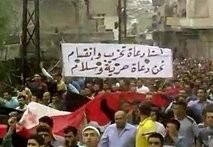Syrian President Bashar al-Assad has ordered troops not to fire on pro-democracy demonstrators, a rights campaigner said, ahead of Friday prayers that have become a rallying point for protesters in an eight-week uprising.
Louay Hussein said Assad's adviser Bouthaina Shaaban told him in a phone call on Thursday that "definitive presidential orders have been issued not to shoot demonstrators and whoever violates this bears full responsibility."
Hussein was among four opposition figures who saw Shaaban this month and presented demands that included an end to violent repression of protesters and the introduction of political reform in the country, ruled by the Assad family since 1970.

The meetings were the first between the opposition and senior officials since demonstrations calling for political freedom and an end to corruption erupted in the southern city of Deraa on March 18.
"I hope we will see (no firing at demonstrators) tomorrow. I still call for non-violent form of any protest regardless of the response of the security apparatus," Hussein said in a statement sent to Reuters.
Fridays, the Muslim day of prayer, offer the only chance for Syrians to assemble in large numbers, making it easier to hold demonstrations. This Friday will be an important test after the government said it had largely put down the unrest.
Shaaban made a similar statement to the one on Thursday at the beginning of the demonstrations in March. Authorities have since blamed most of the violence on "armed terrorist groups" backed by Islamists and foreign agitators.
The Geneva-based International Commission of Jurists said troops have killed 700 people, rounded up thousands and indiscriminately shelled towns during the protests, the biggest challenge to Assad's 11-year authoritarian rule. The government says about 100 troops and police have been killed.
Foreign journalists have been barred from the country, making independent accounts difficult to obtain.
WESTERN STANCE
Washington and its European allies have been criticized for a tepid response to the violence in Syria, in contrast with Libya where they are carrying out a bombing campaign they say will not end until leader Muammar Gaddafi is driven from power.
Syrian forces spread through southern towns on Thursday and tightened their grip on two other cities, broadening a crackdown before Friday.
Tanks advanced in the southern towns of Dael, Tafas, Jassem and al-Harra.
In Deraa, a witness, who declined to be named, said the first significant demonstration erupted on Thursday since tanks shelled the city's old quarter into submission two weeks ago.
The witness, a resident of Deraa, said hundreds of mourners at a funeral for five people killed in the attack chanted, "Bashar get prepared to go" and "The people want the overthrow of the regime."
Government forces fired over the heads of protesters when they marched toward the main mosque in the city.
Assad has responded to the unrest with promises of reform, lifting a 48-year-old state of emergency and granting stateless Kurds Syrian citizenship last month.
Syria's main cities of Damascus and Aleppo have not seen major unrest.
U.S. Secretary of State Hillary Clinton said Washington and its allies would hold Assad's government to account for "brutal reprisals" against protesters and might tighten sanctions, but she stopped short of saying Assad should leave power.
The United States and Europe have imposed economic sanctions on a handful of senior Libyan officials but not on Assad.
"President Assad faces increasing isolation and we will continue to work with our international partners in the EU and elsewhere on additional steps to hold Syria accountable for its gross human rights abuses," said Clinton.
Asked if Assad had lost his legitimacy to rule, she said Washington had watched with "great consternation and concern as events have unfolded under his leadership."
























